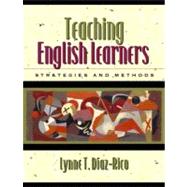
| Dedication | |
| Acknowledgments | |
| List of Tables | |
| List of Figures | |
| Preface | |
| Strategies for Teaching English Learners: A Summary | |
| Who Are English Learners and Their Teachers? | |
| The Profession of Teaching English Learners | |
| Who Are English Learners and What Are Their Needs? | |
| English as an International Language | |
| Professional Organizations for Teachers of English Learners | |
| Critical Roles for Teachers | |
| Educators as Critical Pedagogists | |
| A Critical Sociological Look at Language and Power | |
| Profession, Policy, and Power in the Education of English Learners | |
| Views of Teaching and Learning | |
| Philosophy, Psychology, Anthropology, Sociology, and Postmodern Pedagogy | |
| Philosophical Foundations of Education | |
| Educational Psychology: Behavioral Methods | |
| Educational Psychology: Cognitive Methods | |
| Humanistic Education: Affective and Emotional Factors | |
| Cultural Anthropology and Education | |
| Looking Forward: Postmodernism | |
| The Future of Teaching English Learners | |
| Performance-Based Learning | |
| Why Performance-Based Learning? | |
| What Is Performance-Based Learning? | |
| Standards-Based Learning | |
| What Is the Best Use of Assessment? | |
| What Is Performance Assessment? | |
| Methods of Assessment | |
| Identification, Assessment, and Placement of English Learners in the Schools | |
| Limitations of Assessment | |
| Academic Expectations | |
| Planning Instruction | |
| Matching Performance and Assessment | |
| Monitoring and Adjusting Instruction | |
| Learner Strategies and Learner-Focused Teaching | |
| Learner Control and Academic Competence | |
| Learner Autonomy: Self-management and Self-motivation | |
| What Are Learner Strategies? | |
| Indirect Strategies and Second Language Use | |
| Indirect Strategies: Learning Style Preferences | |
| Direct Strategies: Cognitive | |
| Direct Strategies: Metacognitive | |
| Direct Strategies: Social-Affective | |
| Direct Strategies: Study and Survival Skills | |
| ESL and the Content Areas | |
| Computer-Assisted Language Learning/Computer-Mediated Communication | |
| Learning Processes That Build on First Language | |
| Literacy and Power | |
| Reading Processes | |
| Writing Processes | |
| Listening Processes | |
| Speaking Processes | |
| The Imaginary | |
| The Importance of the Imaginary | |
| Exploring the Imagination | |
| Stimulating the Imagination Directly | |
| Drama in the Classroom | |
| Poetry and the Muse | |
| Music: Listening, Playing, Singing, Creating | |
| The Virtues of the Imaginary | |
| Grammar Through Integrated Language Skills and Wonderful English | |
| English Is Democratic and Creative | |
| Why Integrated Skills? | |
| Integrated Instructional Activities | |
| The History of English | |
| The Curiosity and Beauty of English | |
| Teaching Grammar | |
| Correct Usage and Discourse Competence | |
| Culturally Based Language Teaching | |
| Culture and Language Teaching | |
| The Skills and Responsibilities of the Intercultural Educator | |
| Culturally Derived Learning Styles and Strategies | |
| Culturally Compatible Instruction | |
| Assuming a Bicultural Identity | |
| Culture as Content | |
| Culture of the Target Language | |
| English Teaching Using the Native Culture | |
| Bias in Teaching About Culture | |
| Crosscultural Studies | |
| Using Intercultural Communication to Teach English | |
| Discourse in the Classrooms of English Learners | |
| What Is Classroom Discourse? | |
| What Discourse Genres Are Common in U. S. American Classrooms? | |
| Academic Language Proficiency | |
| Discourse that Affirms Students' Voices | |
| Dual Language Proficiency | |
| Schooling in Two Languages | |
| Dual Literacy Programs: An Introduction | |
| Biliteracy in a Two-Way Immersion Context | |
| Principles of Language Transfer | |
| Biliteracy and Biculturality | |
| Teaching English in Context | |
| Dialects in English | |
| Teaching Standard English: Who's Standard? | |
| Language Variety as a Goal of Instruction | |
| Situated Literacy and Academic Registers | |
| Building a Community of Learners | |
| What Is a Community of Learners? | |
| Why Involve Families? | |
| Community Funds of Knowledge | |
| Transformative School-Community Partnerships | |
| The Idea of Community | |
| Project-Based Learning | |
| Why Projects?Choosing a Project Topic | |
| Project Focus and Development | |
| Project Documentation and Evaluation.< | |
| Table of Contents provided by Publisher. All Rights Reserved. |
The New copy of this book will include any supplemental materials advertised. Please check the title of the book to determine if it should include any access cards, study guides, lab manuals, CDs, etc.
The Used, Rental and eBook copies of this book are not guaranteed to include any supplemental materials. Typically, only the book itself is included. This is true even if the title states it includes any access cards, study guides, lab manuals, CDs, etc.